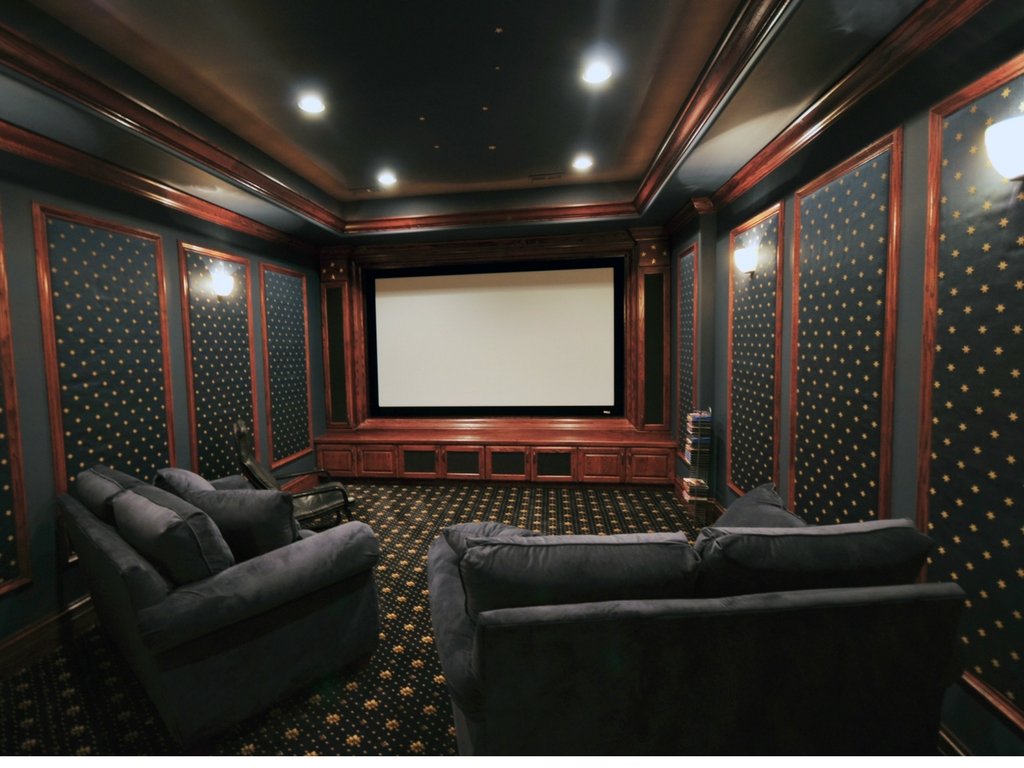If you’re looking for the ultimate home theater experience, you need a soundproof room. A soundproof home theater room will allow you to enjoy your movies and music without any outside noise interference. But how do you go about soundproofing a room?
Here are some tips to get you started.
A soundproof home theater room is the perfect way to enjoy your favorite movies and TV shows without being disturbed by outside noise. There are a few things you can do to create a soundproof home theater room, including adding insulation to the walls and ceiling, using weatherstripping around doors and windows, and installing double-paned windows. You can also purchase special acoustic panels that absorb sound or use rugs and curtains to help deaden noise.
By taking these steps, you can create a peaceful oasis where you can relax and enjoy your favorite entertainment in peace.

Credit: www.acoustic-curtains.com
How Can I Soundproof My Home Theater Room?
If you’re looking to soundproof your home theater room, there are a few things you can do to make sure the sound is contained within the space. First, start with the basics by sealing any cracks or gaps around doors and windows with weatherstripping or caulk. This will help to block out any outside noise that could interfere with your movie-watching experience.
Next, consider hanging heavy curtains over windows and doorways. Thick curtains can do wonders for absorbing sound and keeping it from traveling into other parts of the house (or out of the house entirely). You might also want to consider investing in a thick rug for the floor; this will help to deaden any footsteps or other noise that might come from outside the theater room.
Finally, think about installing acoustic panels on walls and ceilings. These specialized panels are designed to absorb sound, preventing it from bouncing around the room and creating echo or reverberation. Acoustic panels come in a variety of sizes, so you can find ones that fit your specific space requirements.
By following these tips, you can create a secluded oasis in your own home where you can enjoy movies without worry about disturbing others (or being disturbed yourself!).
How Do You Soundproof a Room for Voice Acting?
There are a few things you can do to soundproof a room for voice acting. First, you want to make sure the room is as acoustically neutral as possible. This means absorbing or diffusing any reflections off of hard surfaces.
You can do this with acoustic panels or bass traps placed around the room.
Second, you’ll want to seal any gaps in the room that might let sound bleed in or out. This includes doors and windows.
If possible, you want to use solid core doors and weatherstripping around door frames. For windows, you can use double-paned glass or thick curtains to help reduce noise transfer.
Third, you’ll want to use a good quality microphone when recording your voice acting performance.
A large diaphragm condenser microphone will give you the best results. Place the mic on a stand in front of you, and make sure it’s not picking up any unwanted sounds from the room (such as computer fans). Use a pop filter if needed to reduce plosives from your speech.
Finally, if you’re still having trouble getting rid of unwanted noise in your recordings, you can try using noise reduction software during post-production. This can help clean up your audio and make it sound more professional.
What Do Movie Theaters Use for Soundproofing?
Movie theaters use a variety of methods for soundproofing. The most common is to use heavy curtains or drapes on the walls and ceilings. This helps to absorb some of the noise and prevent it from echoing around the theater.
Another method is to use special insulation in the walls and ceilings. This helps to block out some of the noise from outside and keep it from being too loud inside.
How Do I Stop My TV from Playing Sound Through the Wall?
If your TV is playing sound through the wall, it’s likely because the sound is bouncing off the walls and into your neighbor’s apartment. There are a few things you can do to reduce the amount of sound that escapes from your TV:
1. Use a soundbar or external speakers.
Soundbars and external speakers will direct the sound away from the walls and towards your viewing area, reducing the amount of sound that escapes.
2. Adjust the audio settings on your TV. Many TVs have an auto-volume feature that adjusts the volume based on how much ambient noise is in the room.
Turning this setting off can help reduce the amount of sound that escapes from your TV.
3. Turn down the volume on your TV. This one is self-explanatory – if you turn down the volume on your TV, less sound will escape from it.
4. Move your furniture around. If possible, try to move your furniture so that it isn’t directly up against any walls.
How to Soundproof a Home Theatre Room
Soundproof Home Theater Doors
If you’re looking for a way to keep your home theater room quiet and free from outside noise, soundproofing is a must. And one of the best ways to do this is with soundproof doors.
There are several different types of soundproof doors on the market, but they all work to achieve the same goal: blocking out unwanted noise.
The most common type of soundproof door is an acoustic door, which uses special materials and construction techniques to create a barrier against noise.
Acoustic doors are usually made of solid wood or metal, and they often have multiple layers of insulation in order to maximize their sound-blocking capabilities. In addition, acoustic doors usually have thicker than average weather stripping and door seals in order to further reduce the amount of noise that can enter the room.
Another type of soundproof door is a mass loaded vinyl door. These doors are made with a heavy vinyl material that helps to block out noise. Mass loaded vinyl doors are often used in industrial applications, but they can also be used in homes if you’re looking for maximum sound reduction.
No matter what type ofsoundproof door you choose, it’s important to make sure that it fits snugly in its frame so that there are no gaps or openings for noise to seep through. You should also consider installing additional weatherstripping around the perimeter of the door in order to create an even better seal against noise.
Diy Home Theater Soundproofing
If you’re looking for ways to soundproof your home theater, there are a few options available to you. You can purchase special soundproofing materials, or you can use some creative DIY methods to achieve the same results. Soundproofing your home theater will ensure that you can enjoy movies and TV shows without disturbing the rest of the house.
There are a few different ways that you can soundproof your home theater. One option is to purchase special acoustic panels that can be mounted on the walls or ceiling. These panels help to absorb sound, preventing it from bouncing around the room and causing echoing.
Another option is to use heavy curtains or drapes around the perimeter of the room. This will help to block out any outside noise, as well as reduce reverberation inside the room. Finally, you can also add rugs or carpets to help deaden sounds.
If you’re on a budget, there are still some great DIY options available for soundproofing your home theater. One inexpensive way to reduce echo is by hanging tapestries or blankets on the walls. This will help to absorb excess sound and prevent it from bouncing back into the room.
Another cost-effective method is to build a false wall in front of the existing one using plywood and fiberglass insulation.
Home Theater Ceiling Treatment
If you’re looking to create a truly immersive home theater experience, one of the most important things to consider is your ceiling. After all, it’s the fifth wall of your room!
There are a few different ways you can treat your home theater ceiling in order to improve the sound quality and reduce reflections.
The first option is to use acoustical panels. These can help absorb excess sound and prevent it from bouncing around the room.
Another option is to use diffusers.
These devices help scatter sound waves so that they don’t bounce off the ceiling and create unwanted reflections. Finally, you can also use bass traps. These are designed to trap low frequency sounds so that they don’t cause any reverberation in your room.
No matter which method you choose, treating your home theater ceiling will help improve the overall sound quality of your space. So don’t forget about this important element when creating your ultimate movie-watching experience!
Home Theater Soundproofing Panels
Are you a movie buff? If so, you know the importance of having great sound in your home theater. But did you know that soundproofing your home theater can be just as important?
If you live in an apartment or condo, chances are you’re not the only one making noise. Your neighbors might be watching TV, listening to music, or even throwing a party. All of this noise can bleed into your home theater and ruin the experience.
That’s where soundproofing panels come in. Soundproofing panels are designed to absorb excess noise and prevent it from bleeding into your home theater. They’re typically made from acoustic foam or fiberglass and can be mounted on walls or ceilings.
Soundproofing panels are relatively inexpensive and easy to install, so there’s no excuse not to have them! Not only will they improve your movie-watching experience, but they’ll also help you keep the peace with your neighbors.
Zero Sound Drywall
When it comes to your home, you want it to be as comfortable and quiet as possible. That’s why Zero Sound Drywall is the perfect choice for any home improvement project. This type of drywall is designed to reduce sound transmission, making it ideal for homes with thin walls or adjacent rooms.
Not only will Zero Sound Drywall help to improve the comfort of your home, but it can also increase its resale value.
Soundproof Room
If you’re looking for a way to keep your home recording studio or practice space private and free from outside noise, then consider soundproofing your room. Soundproofing is a process of adding material to walls, floors, and ceilings in order to block out unwanted noise. It’s an effective way to create a peaceful environment where you can focus on your music without distractions.
There are many different ways to soundproof a room, and the best method will depend on the size and layout of the space. For example, if you’re using a small room like a closet or spare bedroom, you might only need to add acoustic panels to the walls and ceiling. But if you’re working in a larger space like a basement or garage, you’ll need to use heavier-duty materials like mass-loaded vinyl or soundproof blankets.
No matter what method you choose, soundproofing your room will require some time and effort. But the results will be worth it when you can finally enjoy peace and quiet while working on your music!
Home Theater Ceiling Material
There are a lot of things to consider when setting up a home theater. You have to think about the furniture, the lighting, the screen, and more. But one detail that’s often overlooked is the ceiling.
Most people just paint their ceilings white and call it good. But if you’re serious about getting the most out of your home theater experience, you need to put some thought into what material you use for your ceiling.
The first thing to consider is acoustics.
If you have a room with hardwood floors and bare walls, sound will bounce around and be amplified. This can be great if you’re watching a action movie with lots of explosions. But if you’re trying to watch a dialogue-driven drama, it can be very distracting.
That’s why many people opt for acoustic panels on their ceilings. These panels help absorb sound and reduce echo. They come in different thicknesses based on how much sound absorption you need.
And they can be covered in different fabrics to match your decor.
If you don’t want to go the acoustic panel route, there are other options available as well. Foam tiles are popular because they’re lightweight and easy to install yourself .
There are also fiberglass tiles that look like real wood or stone but don’t weigh as much . And if you really want something unique , there are even companies that make ceiling tiles out of recycled vinyl records !
Conclusion
If you’re a movie lover, you know that the perfect home theater experience requires both great equipment and the right environment. Unfortunately, many homes are not conducive to ideal movie watching conditions due to outside noise or thin walls. But don’t despair – there are ways to soundproof your home theater room so you can enjoy all the cinematic action without any distractions.
Here are a few tips for soundproofing your home theater room:
1. Use acoustic panels. These panels help absorb sound, preventing it from bouncing around the room and creating echo.
2. Add carpeting or rugs. Not only will this help muffle footsteps and other noises from outside the room, but it will also improve acoustics by absorbing some of the sound waves.
3. Install double-paned windows.
This will provide an extra layer of protection against outside noise pollution.
4. Use heavy curtains or drapes on all windows in the room.


